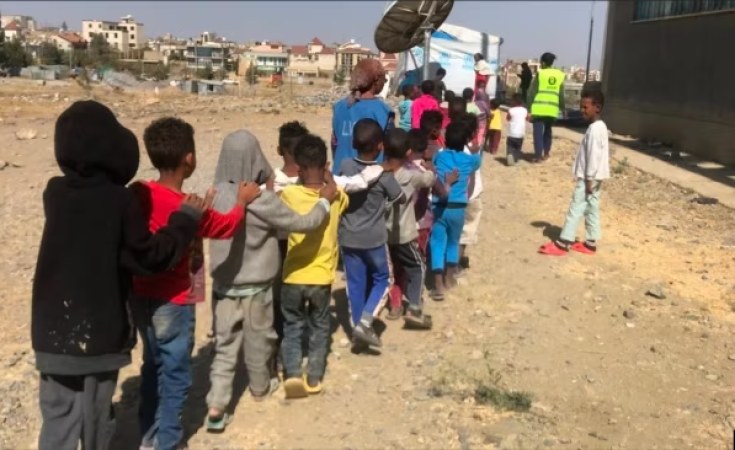Mekelle, Ethiopia — The war in Tigray is over but the trauma lingers.
Tsega Fitsum is a volunteer teacher at the Mai Weyni school in the Tigray regional capital, Mekelle. She says that when school resumed soon after the cease-fire in November of last year, her students' minds were still focused on the conflict.
"They used to be inclined to draw guns instead of writing alphabets and numbers," she told VOA. "But now, we say 'The war has stopped. There is peace and there is no fear, and they should work freely.' When we tell them that, they started working on numbers and alphabets."
Even with that positive sign, the effects of the war are sure to be felt for years to come. The school compound is home to more than 8,500 people who were displaced by the war. About 5,100 are children under the age of 18, most of whom have been deprived of education for more than two years.
The war between Ethiopia's federal government and Tigrayan forces left many children orphaned or separated from their families. The impact of those emotional wounds linger for the children, experts say, as the challenges of healing the war-torn nation begin.
Etsedingel Hadera is a psychiatrist in Mekelle's Ayder Hospital. He said parents can make a difference in helping ease the hidden scars the children carry.
"When parents see behavioral changes, they should give their children hope and let them know it's okay and that it will all pass," he told VOA. "If they are not comforted that way, they listen to everything around them, even when we think they are not paying attention. But they record everything and are exposed to stress and suffering, there is more pressure on them because it is saved internally."
Tsega said the priority now must be healing the children in the school compound and reuniting them with their families.
"Many children were hurt and some were forced to live parentless although they have parents. But if there is peace, they want to go back to school and return to their families. We need to make an effort, especially for the children," she said.
Meresu Gebru, a mother who sought shelter in the compound after fleeing Mai-Kadra, agrees.
"Education is a solution for all. I want education, stability and a place where they can entertain themselves, like a playground. If there is an area where they can play, I think it might help calm them," she said.
Meresu fled the town where some of the war's worst violence occurred with one of her five children. Her four other children, along with her husband, fled to Sudan, seeking refuge. But even residents of the regional capital who live around the school compound say life is far from normal for children.
Mekelle was a site for government aerial bombardments, including a playground at a kindergarten. A resident of Mekelle, Gebregziabher Hadush, said the trauma left from aerial attacks is still felt.
"During the war, children were psychologically traumatized, especially when there were airstrikes and drone attacks," he said. "Even now children have doubts and feel pressured. They don't think planes are coming in for peaceful purposes. They also need physiological treatment."
Now that there is a peace deal, advocates say mental health services should be offered to children as they reenter the classrooms. Psychiatrist Etsedingel said the long-term effects of the war will impact the next generation.
"Children are experiencing behavioral changes in every household. Where can they go? What should they do?" he asked. "What's so sad is some of my patients under 18 say they have lost hope. They are thinking about committing suicide. Some ask, 'What is our hope? School has stopped and we are suffering.' They need psychosocial support."
According to a 2022 report by the U.N., 1.39 million children in the Tigray region are out of school because of Ethiopia's civil war.


